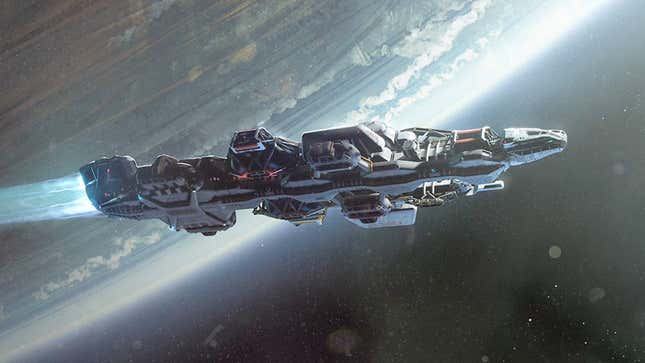
With so, so many planets in Starfield, Bethesda’s upcoming space sim game, there’s a lot of room for speculation ahead of its release on Xbox and PC next year. But the time for guessing games is coming to an end. Inspired by fictional themes and “tone” moreso than hardcore realism, the game aims to preserve fun while also giving a convincing simulation of space exploration, based on recent comments from director and executive producer Todd Howard.
Starfield, the next big open-world Bethesda jam is slated for sometime in 2023. Though we know the game will be in line with the studio’s previous works, with “classic Bethesda-style dialogue” that features many different outcomes, and a large and ambitious open world where space travel is dangerous, there’s still much we don’t know. Director and executive producer Todd Howard recently gave an interview with Lex Fridman discussing Howard’s career, and a variety of mechanics, concepts, and insights into the development process of Starfield. Check out the entire, nearly three-hour interview here:
According to Howard, we shouldn’t expect Starfield to be a rugged space sim where the player needs to track a whole bunch of resources, else they risk getting stranded in space. “There’s some effort involved” Howard said, speaking to the challenge of managing your resources and exposure to environmental hazards, but it isn’t hardcore. The scope of survival and challenge has been tweaked and “dialed back” during the development, which started right after the release of Fallout 4—a development process which he says was more focused by its console exclusivity on Xbox.
“[Running out of fuel in a spaceship] just stops your game, we found. You’ll be playing the game and ‘I ran out of fuel, okay I guess I’ll just wander these planets trying to mine for fuel so I can get back to what I was doing. It’s just, you know, it’s a fun killer.”
Howard speculates that a hardcore mode might be in store for the game in the future, but for now you can expect common-enough challenges like needing to monitor your space suit for environmental hazards in space or on planets, but not a No Man’s Sky level of making sure all your ship’s systems are perfectly fueled and operational.
Starfield’s planets and star systems, which Howard described as a balance between “the handcrafted content [and] open procedural planet experience” were built using “realistic-looking” tilesets that are then processed to wrap around a whole planet, a development practice not too uncommon for Bethesda games.
Bringing space to life, Howard said, was a question of how Bethesda could “have a system to generate these planets and make them look [...] reasonable, as opposed to [...] fractally goop,” referring to rendering and modeling techniques that are far more random and have less intentional artistic design. Possibly, this is partially in response to the ongoing concern that the game has too many planets. The planets and the systems themselves, Howard went on to say, will also be leveled with a number, indicating the scale of difficulty one might expect in a certain region of space.
The interview covers a bunch of topics regarding science fiction, and “tone,” described broadly as the way the game immerses you in its world, its overall feel, and how that expectation guides the various systems the studio developed. You’ll have to put up with listening to a whole Lex Fridman interview, a man known for platforming bigots like Ben Shapiro and Jordan Peterson, and overall shallow praises of characters like Elon Musk (who is mentioned in the Howard interview), but at least there are some cool bits of video game trivia and insights from Howard.